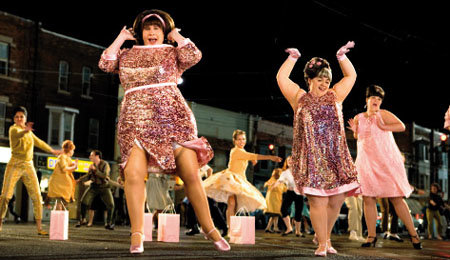
뚱뚱한 사람을 뚱뚱하지 않다고 하는 거짓말은 좋은 선택인가 아닌가. 영화 ‘헤어스프레이’.
나쁜 선택과 좋은 선택 모두 똑같이 부정적 결과를 가져올 것인가? 이 문제에 대한 당신의 견해를 전개하는 에세이를 기획하고 쓰시오. 논리적 추론과 독서, 학업, 경험 또는 관찰에서 얻은 예를 들어 당신의 생각을 뒷받침하시오.
- SAT Essay 주제
[학생 작문] Most people are greedy [1] that cares only about their own good and benefit. If they don’t get [2] benefit, then they think [3] as negative. [4] Similar to choices that [5] people think if either good or bad choices [6] [7] don’t have benefits [8] then they will consider [9] [10] as negative results. If peoples [11] are less greedy and selfish, then they [12] will know both good and bad choices [13] have positive results.
No matter what [14] result have [15] it’s depends on what people learn from [16] choices. [17] So both good and bad choices [18] equally likely to have good consequences because if people learn from choices, then it’s good. Also, [19] it’s experience that people will [20] not make same choices.
When people have choices between good or bad, most people [21] choise good. Yet bad choices can have equally good consequences [22] like good choices have. For example [23] everyday people learn from anything [24]. If people made bad choices and have negative consequences [25] more they learn from choices then negative consequences can be change to good consequences because people learn that they should not do it. Thus, negative consequences can [26] changed [27] positive consequences [28] like good choices [29] have good consequences.
[30] In addition, negative choices can have positive consequences because negative choices can be good like lie. When fat friend ask people is he fat then most people say he is not fat that can keep friendship. Although lying is bad choices, lies can help and have good consequences like example.
People should not only think [31] for benefits [32] and think what they learn from both choices. Thus, no matter [33] either good or bad choices, choices [34] have good consequences.
|
[Comment] Very good argument. However, you may have to first define: “What is a good choice? What do we mean by a bad choice?”
You write one paragraph about a “fat” friend and lying to save the friendship. You equate lying with a bad choice, as if lying is inherently bad. But I think the question is more subtle than that. It is asking about making a choice between Option A and Option B. Option A, for example, is a good choice for various reasons, but mainly because of the result. For e.g., “If we exercise, we will become healthy.”
A bad choice is usually made knowing that the conse-quences are risky or harmful.
“If I abuse drugs, I will harm my health.”
You have a great premise in that you start off by arguing that people are inherently selfish and self-centered, so that every choice is considered to be “good” so long as there are “benefits.” But as with your “fat friend” example, sometimes the choices are not clear and more difficult. Yes, it might be good to not hurt your friend’s feelings, but what if he believes in the lie and he ends up harming himself because of the lie?
So regardless, I believe that for this question you have to look at the consequences of the choices and how THAT helps us to define a good decision versus a bad decision.
매우 좋은 논쟁입니다. 그러나 무엇이 좋은 선택인지, 무엇이 나쁜 선택인지 먼저 정의를 내려야 합니다. 첫 번째 단락에서 뚱뚱한 친구에 대해, 그리고 우정을 지키기 위해 거짓말하는 것에 대해 썼습니다. 당신은 거짓말과 나쁜 선택이 밀접하게 관련 있는 것으로, 마치 거짓말은 본질적으로 나쁜 것으로 여기고 있습니다. 그러나 이 에세이의 질문은 그보다 미묘합니다. A와 B 사이의 선택에 대해 묻고 있는 것입니다. 예컨대 선택 A는 다양한 이유 때문에, 특히 그 결과 때문에 좋은 선택이 됩니다. 당신은 사람들이 원래 이기적이고, 자기중심적이라고 주장하면서 글을 시작한다는 점에서 좋은 전제를 하고 있습니다. 그래서 인간의 모든 선택은 이점이 있는 한 좋은 선택으로 간주됩니다. 그러나 당신의 뚱뚱한 친구의 예에서처럼 때때로 선택이라는 것이 명확하지 않고 더 어렵기도 합니다. 물론 다른 사람의 감정을 상하게 하지 않는 것이 좋을 겁니다. 그럼에도 만약 그 사람이 거짓말을 믿고 그 때문에 자신을 망치게 된다면 어떻게 하실 건가요? 이 질문에 대해서 선택의 결과를 살펴보고, 그것이 어떻게 우리의 선택을 구분할 수 있게 하는지 생각해보기 바랍니다.
















